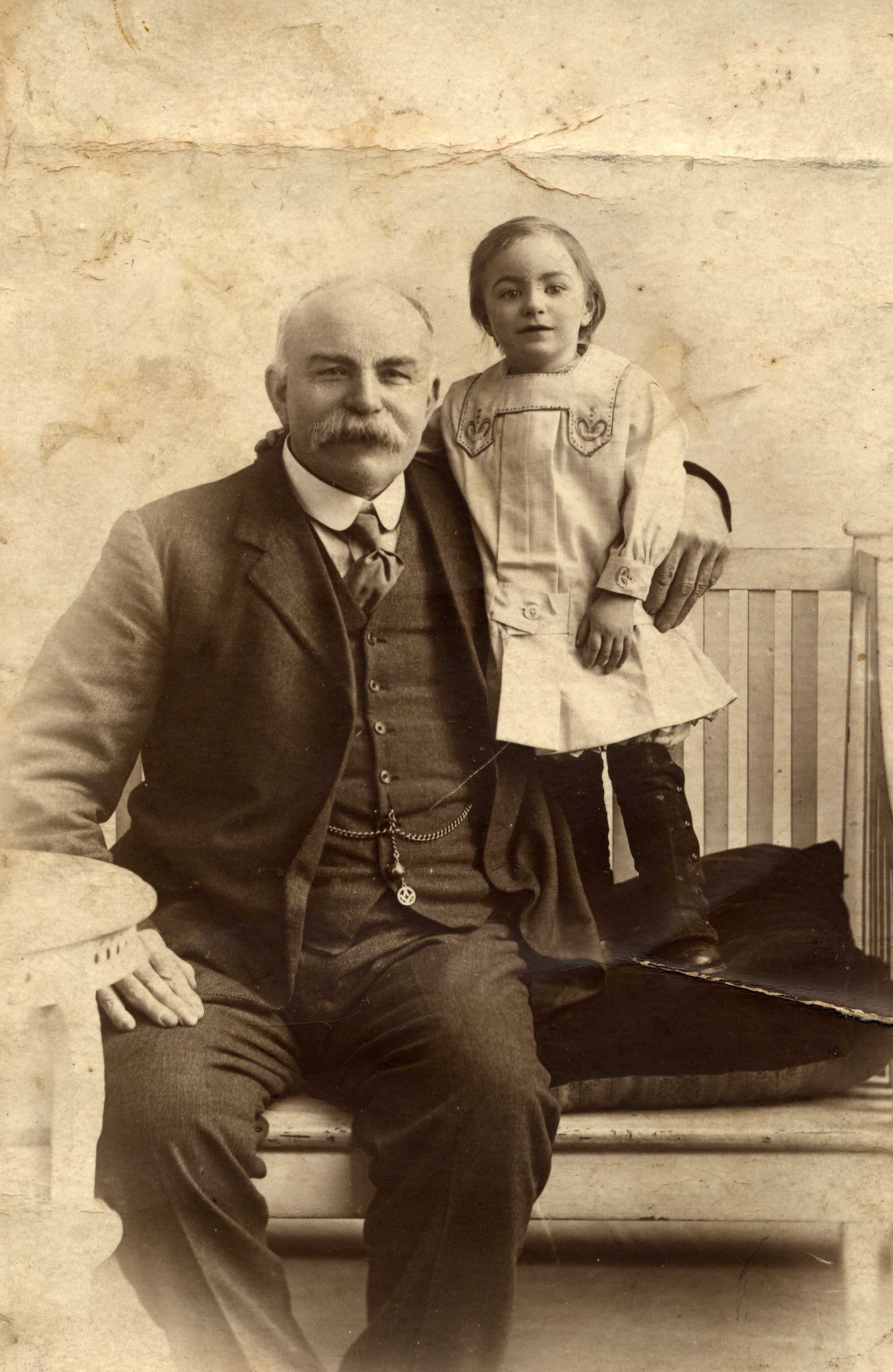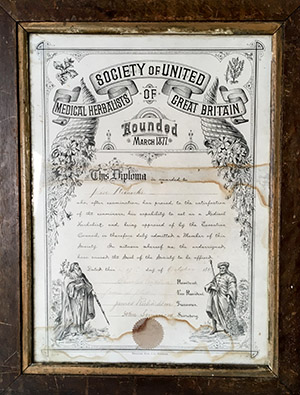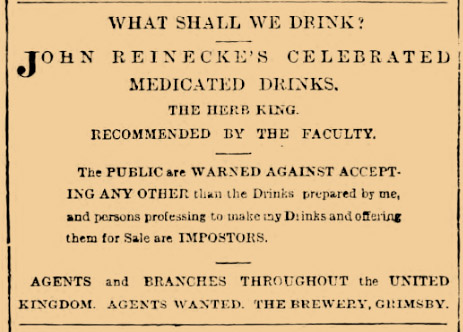Reinecke's soft drinks bar, on the corner of Corporation Road and Rendel
Street, Grimsby.
In 1900
John was in Leeds, where he had a Refreshment Rooms at 111 Hunslet
lane. He was fined 20s in April that year for selling milk containing
22% water. He was soon to move to Bristol where he took a cottage near
the former racecourse at Knowle.
SINGULAR DRINKS IN ST. PHILIP'S (Western Daily Press -
Thursday 26 July 1900 p.7)
John Reinecke was summoned for keeping a
refreshment-house at 88, West Street, St. Philip's, open after 10 p.m.
on Sunday July 15th. Mr. H. R. Wansbrough appeared for the defendant.
P.S. Rich, 20A, gave evidence as to the hour at which the shop was
open, and described the variety of drinks on the counter. In some
cases he and another officer watching saw change given, and at length
went into the shop, reminding the defendant that all licensed houses
were closed at 10 o'clock on Sunday. Defendant replied, "I am not
licensed, and have never been interfered with before in any other
town." Witness told him he should report him. There were stools and
tables in the shop and people were sitting there. Cross-examined, the
words medical herbalist were painted over the door, and herbal
dispensary on a card in the window. There was also a diploma (see
above) stating that the defendant had passed the examination of
the Society of United Medical Herbalists of Great Britain, and had
been enrolled as a member. Mr. Wansbrough stated that the case the
bench had to decide was whether the drinks were refreshments within
the meaning of the Act of Parliament. The barrels in the shop
contained medicated drinks, and up till ten o'clock at night he sold
ginger beer and other drinks, as he was entitled to do, but not after
that hour. Defendant said the business he carried on was that of
medical herbalist, and the stuff sold on the night in question was
dandelion stout, and sarsaparilla and herbal medicated drinks supplied
for the liver, blood, indigestion, &c. After ten o'clock at night
only those two drinks were sold.
Mrs. Ada Elizabeth Reinecke spoke as to the liquors
she served after 10 o'clock on the Sunday night, and P.S. 10A deposed
to seeing white and brown liquids in the glasses. The bench said they
were of the opinion that the opinion that the defendant was keeping
the house open for the refreshment, resort, and entertainment of the
public. It would be idle to suppose that persons would go there to
drink medicinal drinks in the way they did. They were satisfied that
other than medicinal drinks were sold, and they fined the defendant
20s and costs, or 21 days imprisonment in default of payment.
REFRESHMENT HOUSE OR HERB SHOP - A TEST CASE IN BRISTOL (Western
Daily Press - Wednesday 29 October 1902 p.7)
John Reinecke, describing himself as a medical
herbalist and carrying on business at 29 East Street, Bedminster, was
summoned at the Bristol police court yesterday before Messrs. J. H.
Howell and E. Parsons for keeping open a refreshment house during
prohibited hours and with selling refreshments during prohibited hours
on July 12, 13, 19. Mr. Wise, from the Town Clerk's Office,
prosecuted, and defendant was represented by Mr. H. R. Wanbrough. Mr.
Wise, in opening the case, stated that the informations were laid by
the Superintendant of the Bedminster Division. The refreshment houses
in Bristol must be closed between the hours of 11 p.m. and 4 a.m., but
the dispute in this case, he imagined, would centre round the question
whether this place was a refreshment house or not. The evidence of the
police showed that on a number of days in July the house was
frequented by a large number of persons between 11 o'clock at night
and the early hours of the morning. On July 5th, at 11.50 p.m. 30 men
and women were on the premises; on 6th July between 12.20 and 1.10 30
persons visited the shop; on the 12th July between 11.50 and 1.20
there were 48; on the 13th between 10.15 and midnight there were 86;
on the 14th between 10.15 and 11.50 there were 52; and the number
varied until the 19th July, when between the hours of 10 p.m. and
12.20 a.m. 157 persons visited the premises. Persons went into the
shop and were served with refreshments, some of which was consumed on
the premises and some taken away in receptacles. They were not for the
most part weakly but robust persons who had been spending the night
out apparently. The favourite drink was sarsaparilla made up to
imitate beer. This, on being analysed, was found to contain one per
cent of sarsaparilla, the remainder being water, so that it was of no
value whatever as a medicine. The premises were got up in an
attractive manner, with herbs hung on the walls. The shop was
brilliantly lighted and had something of the appearance of a
summer-house or bower.
P.C. Burge, 31 B, gave particulars as to the
numbers of persons he had seen visiting defendant's shop during
prohibited hours.
The Assistant Magistrate's Clerk (Mr. Braithwaite):
Do you find it an agreeable drink? Yes, it's wet (Laughter.)
The Chairman said he would like to taste it.
Mr. Wansbrough stated he had brough a well-supplied
luncheon basket. (Laughter.) He produced a basket filled with bottles,
herbs and boxes of pills.
The witness, continuing, said some asked for
a penny glass and others for a three-halfpenny glass. Some asked for
sarsaparilla. Many sat here drinking and talking. The customers were
working-class people, mostly young. In reply to Mr. Wansbrough,
witness said he had some of the drink at New Brislington on the
previous day, some of the same firm's. The drink was not agreeable to
his palate, and he would be sorry to drink a lot of it.
Mr. Wansbrough: Your palate has been affected by
beer perhaps. (Laughter.) Since the defendant had opened there the
mortality of Bedminster had fallen to a very low rate.
Mr. Parsons: Perhaps you will come over and live
there, Mr. Wansbrough.
Mr. Wansbrough: I hope so, sir, when I can afford
it. (Laughter.)
P.C. Holland, 38B, also gave evidence as to the
number of visitors to the shop on 19th July.
By Mr. Wansbrough: He had not tasted the drink. A
lot of people went there half drunk.
Witness refused a drink proffered by Mr.
Wansbrough, but consented to smell it. He thought there was peppermint
in it. The Chairman also smelt it, but apparently was not agreeably
impressed.
Inspector Carter and P.C. 44B also gave evidence as
to keeping observation on the house.
Supt. Turner stated that the largest number of
persons visited the shop between 10 p.m. and midnight. On 5th of July,
at 11.30 p.m., he saw about thirty persons there - men, women and
children. Some were sitting round a table with pint glasses containing
drink, which had froth on the top of it. He had to keep two or three
extra men in the vicinity of the shop, especially on saturday nights
and Sunday mornings, owing to the class of people who frequented the
place.
By Mr. Wansbrough: He sent police officers to
places of amusement and to places where municipal meetings were being
held to see that there was no disturbance.
A shopkeeper was called, and he said he sold the
defendant's dandelion stout and sarsaparilla as beverages.
Cross-examined: He had a gallon of each as samples,
but it did not sell very well. He had one of the bills headed "The
Herb King."
Dr. James Young, of St. George, stated that the
mixtures of sarsaparilla and dandelion stout respectively were of no
medicinal value. Neither of these things was ever used alone as
medicines.
By Mr. Wansbrough: He spoke as a medical man, and
knew nothing as to the practice of herbalists.
Mr. Wansbrough, for the defense, said there had
been an appeal on this subject at the quarter session in Lincoln, and
it had been held that these drinks did not come within the meaning of
refreshments. It was not drink of an agreeable nature. It was only
necessary to look at his Worship's face when drinking it to see that
it was not so. Though defendant might sell ginger beer during the day,
he only sold cough balsam, sarsaparilla, dandelion stout, pills,
&c., after 10 p.m. The fact that so many people called there
showed that they were supplying a public want rather than creating a
nuisance. The shopkeeper called for the prosecution told them that
people would not buy the drinks as beverages, but for the ailments
mentioned in the list which he held in his hand people did buy them.
Defendant was put into the witness-box, and stated
that he lived at 88, West Street, St. Philip's, and that he was a
member of the Society of Medical Herbalists. In the basket produced he
had the ingredients from which the drinks were made, and he proceeded
to enumerate these. They were made as medicinal drinks, and he had
never any idea of making them for refreshment. He sold ginger-beer and
other drinks as refreshment before 10 p.m. He fought an appeal at
Lincoln session, and a verdict was given in his favour, with costs. He
had been selling at Grimsby ever since.
Cross-examined: Orders were sent to him, and goods
were delivered by a man who was not a canvasser. He did not keep a
traveller. Asked why so many perple visited his shop after 11 o'clock,
witness replied that it was to do them good. Some took his medicines
to do away with the effects of alcohol.
Dr. E. H. Cook, analytical and consulting chemist,
said the sarsaparilla and dandelion stout were medicated drinks. They
were of the class of mixtures sold by herbalists. He did not see how
they could be described as refreshments. In half a pint of this
sarsaparilla there would be 406 grains of solids, which would be a
very fair quantity for some medicines.
The bench thought it was an intricate and important
case, and they would give their decision in a fortnight, on 11th
November, at 3 o'clock.
The case was found for the prosecution and John was
fined £1 with £3 costs for selling drinks during prohibited hours, but
he intended to appeal the case of keeping his house open.
KILLED THROUGH HIGH HEELED BOOTS: (Western Daily Press -
Tuesday 13 January 1903 p.3)
Also [inquest] at Bedminster Police Station, on the
body of Harold Reinecke, aged 15 months. John Joseph Reinecke, a
herbalist, of Upper Knowle, identified the deceased as his son. On
Wednesday last he went to London, and on his return his wife told him
that she had fallen down stairs with the child in her arms. She had
high heeled boots, and one of the heels came off, causing her to loose
her balance and fall over about 14 stairs. The child seemed
frightened, and next morning noticing a discolouration over his eye,
he sent for a doctor. Death, however, took place on Saturday morning.
Witness's wife was getting better, and was able to get up for the
first time that day. Elizabeth Bence, a servant in the employ of Mr.
Reinecke, said that she was making tea, when she heard the noise of
the fall, and found Mrs. Reinecke and the baby lying at te foot of the
kitchen stairs, which were very steep and narrow. Dr. William Conway
Gent, Brookside, Upper Knowle, said the child was bruised on the
forehead, left eyelids, and nose. He did not see deceased again till
after death, which, in his opinion, was due to convulsions, following
concussion of the brain. The jury returned a verdict of "accidental
death."
On the 10th January 1903, only just after the death of his son, John
lost his appeal in Bristol at the quarter sessions, there followed
that year more prosecutions:
From "
The Chemist & Druggist", 20th June 1903:
At Grimsby on June
11, John Reinecke, botanical brewer, Bristol, was summoned for keeping
a refreshment-house without a licence. Mr. Denniss, who prosecuted for
the Inland Revenue, sought to show that the botanical drinks sold by
defendant were merely sugar solutions flavoured with small quantities
of extract of herbs. Mr. Schultess Young, barrister, who defended,
contended that the drinks were medicated with extracts made according
to the Pharmacopoeia. The Bench reserved their decision.
John received a fine on 2 counts of selling
refreshments at Freeman Street, Grimsby in 1903 without a proper
license, but his appeal was successful on the grounds that his manager
was Thomas Reinecke and he himself was not the resident occupier as at
the time, as he now lived in Bristol.


 John gained a diploma from the Society of
United Medical Herbalists of Great Britain (founded in Rochdale, 1877) on
9th Oct. 1889 and by that year he had a shop at 20-22 Trinity Street,
Gainsborough, Lincolnshire where his son John Joseph was born, he was here
until 1891. This was a period where herbalism was trying to dissociate
itself with astrology and establish itself as an accepted science. By 1890
the United Society had been absorbed into the National Association. In
1892 John was at 4 Freeman Street, Grimsby where he gained his
naturalization as a British citizen on 27th Feb. That Christmas he
provided seven 18 gallon barrels of temperance drinks, in the form of hop
ale, dandelion stout, and sarsaparilla, together with pipes, tobacco and
snuff, for the inmates of Caistor Union Workhouse. On 23rd March 1894 (Stamford
Mercury), John's Grimsby business was for sale by private tender:
"All that large and well-appointed Aerated Water Manufactory, Offices, and
Premises, together with Engine, Boiler, loose and fixed Machinery,
Stabling, Sheds, out-houses, Yards, and buildings, at the junction of
Charlton Street and Armstrong Street, West Marsh, Great Grimsby. Also the
Stock-in Trade of an Aerated Water Manufacturing business, carried on
there by Mr. John Joseph Reinecke, and the Drays, Harness, and other fixed
and loose Effects upon the premises. The property is well and
substantially built, is fitted regardless of expense, and is three storeys
high. The machinery is upon the most approved and scientific principles,
and has been laid down within the last two years." Note that the location
here is given as the next street South from Adam Smith Street although it
may have been referring to the same factory.
John gained a diploma from the Society of
United Medical Herbalists of Great Britain (founded in Rochdale, 1877) on
9th Oct. 1889 and by that year he had a shop at 20-22 Trinity Street,
Gainsborough, Lincolnshire where his son John Joseph was born, he was here
until 1891. This was a period where herbalism was trying to dissociate
itself with astrology and establish itself as an accepted science. By 1890
the United Society had been absorbed into the National Association. In
1892 John was at 4 Freeman Street, Grimsby where he gained his
naturalization as a British citizen on 27th Feb. That Christmas he
provided seven 18 gallon barrels of temperance drinks, in the form of hop
ale, dandelion stout, and sarsaparilla, together with pipes, tobacco and
snuff, for the inmates of Caistor Union Workhouse. On 23rd March 1894 (Stamford
Mercury), John's Grimsby business was for sale by private tender:
"All that large and well-appointed Aerated Water Manufactory, Offices, and
Premises, together with Engine, Boiler, loose and fixed Machinery,
Stabling, Sheds, out-houses, Yards, and buildings, at the junction of
Charlton Street and Armstrong Street, West Marsh, Great Grimsby. Also the
Stock-in Trade of an Aerated Water Manufacturing business, carried on
there by Mr. John Joseph Reinecke, and the Drays, Harness, and other fixed
and loose Effects upon the premises. The property is well and
substantially built, is fitted regardless of expense, and is three storeys
high. The machinery is upon the most approved and scientific principles,
and has been laid down within the last two years." Note that the location
here is given as the next street South from Adam Smith Street although it
may have been referring to the same factory.

